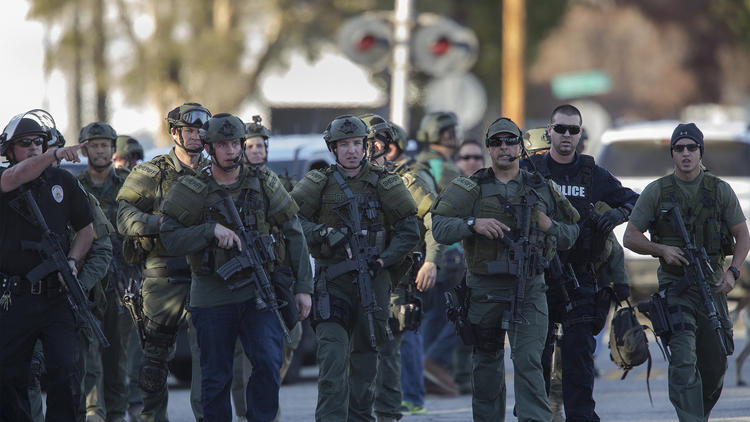Authorities work to understand the motivation behind the recent shooting in San Bernardino that left 16 dead, including the two suspected shooters. Author of the up-coming book Beyond Columbine, Julie Webber sees similarities in the incident at the Inland Regional Center to other mass shootings that paint a larger picture.
Webber:
The media automatically looks to contain a tragedy like this by looking for the why. And we all look for reasons. Yet this wasn’t what you would call a typical workplace-anger shooting, usually committed by men. His wife participated. And the fact that both of them wore tactical gear suggests it was planned.
It doesn’t look like what we imagine as a terrorist attack either, because it doesn’t appear as though any group backed them. Granted, his parents were from Pakistan, and she was also Pakistani by way of Saudi Arabia, yet these two people were living as Americans. He was born in Illinois, went to high school in Riverside, and she received her green card in July.
People are thinking this may be a case of what is being called “self-radicalization” —meaning they could have taken up a personal cause—but I would add that in this case it was done without ideology, or a grudge delinked from politics proper. Much like the Boston bombings, when the brothers declared themselves part of a cause.
Yet this sounds more like Columbine and Newtown, Connecticut. They were prepared. They had a plan. And we’ll probably discover that they felt isolated and disconnected, with an instability that had not been detected or reported.
In many ways, it feels as though the whole country is becoming unhinged. One can hope we talk about closing the loopholes in the gun laws, but everything the couple in San Bernardino did to get the guns was legal. They passed the background checks. Neither of them had any reported history of arrest or mental illness. Nothing was out of place.
Guns are too easy to get, but this is part of a larger problem. People are facing emotional and economic deprivation all over the country. The greatest stop-gap measure would be for people to vote in sane politicians who would improve economic conditions and fund long-term initiatives to work with mental illness.
The attack on Planned Parenthood was committed by a man who was known by family and neighbors as violent and unstable. But they felt there was nothing they could do. He would be arrested, held for 72 hours, and then released. We do not have any kind of adequate mechanism in place that is not punitive, or a revolving door of going to jail and being set free.
The lack of mental health funding and a lack of drug and alcohol therapy in the United States is a major part of the problem. Add to that the infamy that comes with these episodes, the sensationalized media coverage and polarized politics. There is something much larger that is wrong.
Julie Webber is a professor of politics and government at Illinois State University. She can be reached via MediaRelations@IllinoisState.edu.

